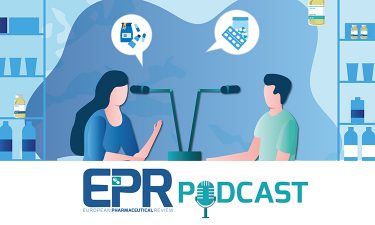
European Pharmaceutical Review podcast
EPR Podcast 19 – Collaboration in microbiology – Allison Scott, Lynn Johnson and Miriam Guest, M³ Collaboration

The Modern Microbial Methods Collaboration or M3 Collaboration brings together participants from across industry with the goal of modernising pharmaceutical microbiology.
In this episode, Alison Scott, Lynn Johnson, and Miriam Guest, introduce the work of the group and discuss how it is working to address common challenges facing industry.
Established in 2021, the M3 collaboration consists of a steering committee and three sub-teams. The steering committee helps guide the group, and the sub-teams focus on specific topics such as biofluorescent particle counting, understanding baseline counts and setting alert levels, and developing communication tools for modern methods.
How does collaboration in microbiology benefit industry?

Allison Scott is Principal Scientist, MicronView. M3 Collaboration Steering Committee and Sub-Team #3 Facilitator
The collaboration supports industry by promoting knowledge sharing and learning among participants. It allows for open dialogue and problem-solving, facilitates the adoption of modern microbial methods, and provides a platform for communication and collaboration across different companies and backgrounds.
“From our perspective at AstraZeneca, we are really valuing the cross-industry collaboration that we’re seeing in the non-competitive space,” says Miriam Guest, Principal Microbiologist,
Pharmaceutical Technology & Development, AstraZeneca, who initially joined as a member of the Online Water Bioburden Analyzer (OWBA) Working Group.
“We’ve got hundreds of years of [combined] experience across all of the members of this collaboration and so many different backgrounds,” adds Allison Scott, M3 Collaboration Steering Committee and Sub-Team #3 Facilitator.
Another benefit is that there are no costs associated with joining the M3 Collaboration “it’s truly just people volunteering their time, sharing ideas”, explains Lynn Johnson, Senior Scientist, Microbial Control and Viral Safety, National Resilience, Inc and Member of M3 OWBA working group.
Addressing industry challenges

Miriam Guest, Principal Microbiologist, Pharmaceutical Technology & Development, AstraZeneca
The M3 collaboration listens to what’s happening in industry to help form or influence what it’s working on.
“Adoption of new technologies has always been a challenge in this industry,” explains Allison. As modern methods can take a lot of time and be expensive to adopt, seeing other companies succeed can be ‘very beneficial’ – they can share their success, they can share the challenges that they’ve overcome, and this really helps lead the industry forward.
Data integrity is seen as an emerging issue. “We are certainly seeing trends with our auditors and regulators looking at data integrity across the whole quality control platform. And when you review the published warning letters on the FDA [US Food and Drug Administration] website, you know data integrity in the microbiology lab is a real issue,” says Miriam.
“There is definitely more adoption of modern microbial methods,” adds Lynn. “I think it’s a critical time right now to be able to share our ideas, how we’re getting things moving forward and implementation strategies.”

Lynn Johnson, Senior Scientist, Microbial Control and Viral Safety, National Resilience, Inc is member of the M3 OWBA working group
Another area where the collaboration is supporting industry is in developing a holistic contamination control strategy,” adds Lynn, noting that the collaboration is working to provide tools and templates to help address some of these challenges.
The M3 collaboration has made progress in several areas, including on developing a User Requirement Specification template, working on several articles and presenting at industry events.
Through this work it is contributing to the advancement of modern microbial methods and driving innovation in pharmaceutical microbiology through industry collaboration and knowledge exchange.
About the speakers
Allison Scott is Principal Scientist, MicronView. M3 Collaboration Steering Committee and Sub-Team #3 Facilitator
Lynn Johnson, Senior Scientist, Microbial Control and Viral Safety, National Resilience, Inc and Member of M3 Online Water Bioburden Analyzer Working Group
Miriam Guest, Principal Microbiologist, Pharmaceutical Technology & Development, AstraZeneca and former member of the M3 OWBA Working Group.
The post <em>EPR</em> Podcast 19 – Collaboration in microbiology – Allison Scott, Lynn Johnson and Miriam Guest, M³ Collaboration appeared first on European Pharmaceutical Review.